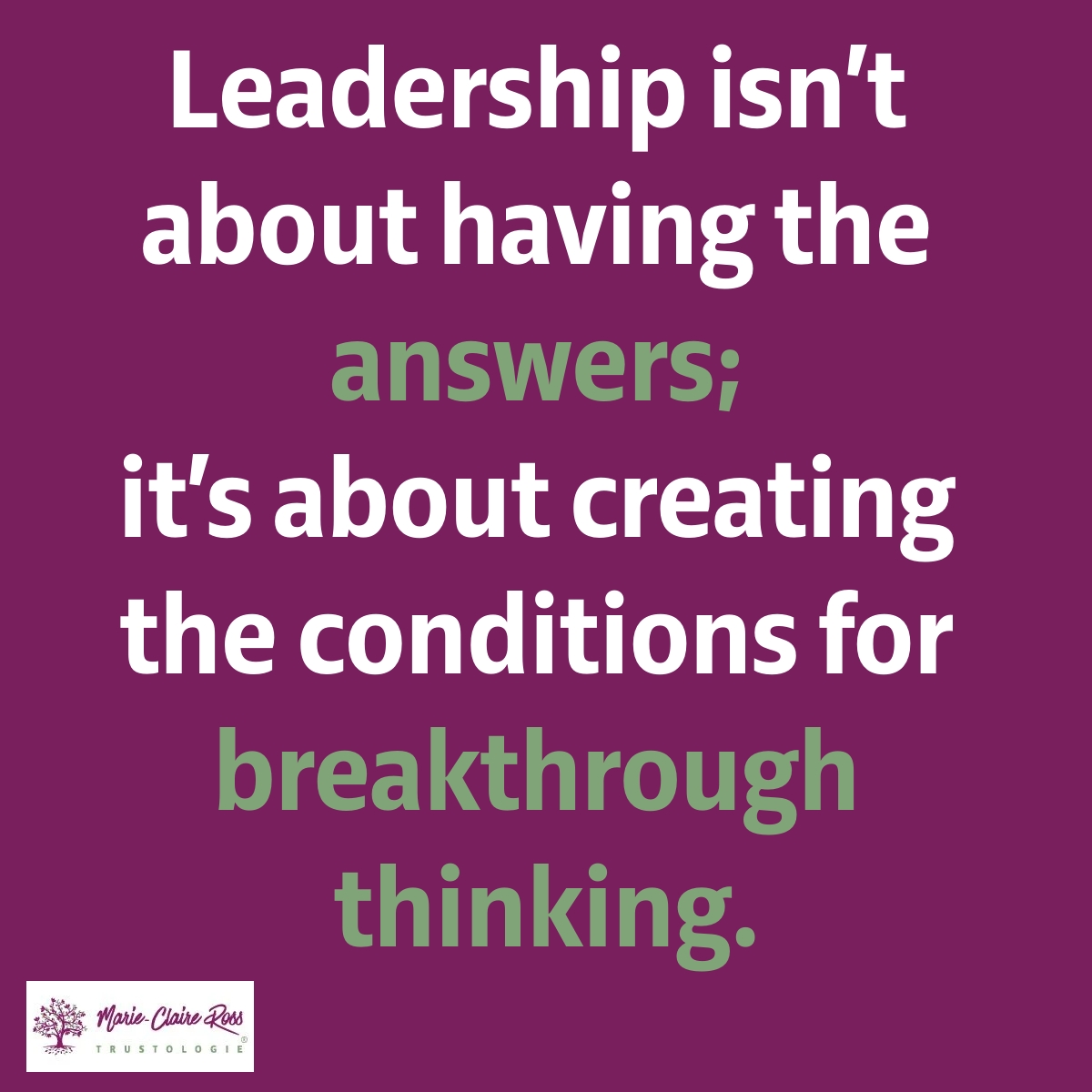8 min read
Beyond the "Why": 5 Coaching Secrets to Unlock Curiosity in Leadership
When my daughter was 17 months old, she discovered a superpower: the word “Why?”For the next two years, it was her response to almost everything.
Develop leaders, strengthen executive teams and gain deep insights with assessments designed to accelerate trust and performance.

Transform how your leaders think and perform with keynotes that spark connection, trust and high-performance cultures.

Explore practical tools, thought-leadership and resources to help you build trusted, high-performing teams.

Trustologie® is a leadership development consultancy founded by Marie-Claire Ross, specialising in helping executives and managers build high-trust, high-performing teams.

3 min read
Marie-Claire Ross : Updated on October 12, 2021
-1.jpg)
There is no doubt that COVID has changed our workplaces forever. Things will never go back to business as usual. All of us have been changed - whether we are aware of it or not.
The days of full offices, attending back-to-back face-to-face meetings and battling traffic five days a week are over.
And how we lead teams has been turned on its head. It's no longer reasonable to expect that you can check in with people when you see them in the tea room. Or that your regionally based direct reports will know that you care about them when you smile at them in a weekly Zoom meeting.
And yet, so often I hear about leaders who believe that things will go back to BAU. But Business as Usual needs to be renamed Business is Unusual. The same old habits, communication styles and interactions are no longer working.
Remote employees feel disconnected, overwhelmed and exhausted. And while they still want to work when and where they like, they want to be lead and treated differently. They want new and improved leadership qualities from their leaders.
Organisations and leaders who don't accept that face high turnover. People are prepared to leave. The Great Resignation is valid - the world over.
The three top areas that people tell me that need to be overhauled include:
1. Measuring Outcomes, not Outputs
Technically minded people find a lot of safety and comfort in processes and tasks. This means that there is a focus on outputs, rather than what outcomes are being achieved. They focus on tasks, not people. It makes it hard to trust that people are working - when you can't see a result straightaway.
It requires leaders to shift from measuring outputs to outcomes. Getting results isn't only determined by what time an employee clocks on or off. When you focus solely on tasks, you put your team squarely into the anxiety zone.
How we talk about work has to change. It requires helping people understand the meaning in their work. You can't run a team meeting that is all about tasks when you're online. Just talking about tasks non-stop turns people off and adds to their overwhelm and isolation.
2. Deferring to those you Know
Since the pandemic, job roles have changed, as well as how we work. Today, businesses are coming up against tough problems that can't be solved in a five minute phone call.
Collaboration has become key. Not just in a team or one department. Yet, a lot of leaders and managers struggle to know who to bring in to solve a problem or how to communicate with those from different areas.
The result is most leaders will go to those in the business that they already know. It means that they are not accessing the right information - wasting time and resources. Or they will set up a meeting with a large group of people - but it's difficult to solve a problem with 15 people on a Zoom call.
Knowing who is an expert in particular areas across a business is becoming an important leadership quality. It requires spending more time building relationships. Building relationships was easier face-to-face, but online it requires different techniques.
3. Staying in a Comfort Zone
By far the biggest complaint I receive about leaders and managers is that they are staying in their comfort zone. Or what I can the Abatement Zone.
-1.jpg?width=2312&name=Psychological-Safety-and-Accountability%20(1)-1.jpg)
And I get it. Life has been pretty demanding and overwhelming over the last 19 months. Sometimes we want to coast because we are burnt out and depleted. In today's weird world, it's hard to even find the motivation to know what to do.
Unfortunately, staying in a comfort zone means that our performance is declining. It's not good for us, our people or our organisation.
In a constantly changing world, team leaders and managers are more important than ever. You help provide the emotional support, clear communication and connection that ensures people feel that their work matters. That they are valued. This doesn't just impact people's job fulfilment, but their own personal fulfilment. It means you can boost or deplete people's wellbeing. Even your own.
I'd love to share some tips to help you. If you want to strengthen your leadership qualities, then join me for a free webinar - "How to Lead Your Team into the Achievement Zone." It will provide you with the energy and motivation that you need.

8 min read
When my daughter was 17 months old, she discovered a superpower: the word “Why?”For the next two years, it was her response to almost everything.

11 min read
I have a friend who often finds herself at the mercy of her emotions. Recently, she called me to rehash a confrontation she’d had with a group of...

9 min read
True leadership presence isn’t a performance or a set of charisma hacks; it is the felt experience of who you are being in the room. By cultivating...
A quality is part of our personality that comes naturally to us. For example, you might think of one of your friends as 'always being generous'....

Have you ever wished you could have worked alongside some of the world’s best CEOs? How about the chance to have worked alongside Steve Jobs? Closely...

Recently, one of the biggest complaints that I have been hearing about leaders is how a lack of self-awareness is impacting their performance....